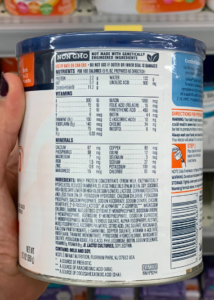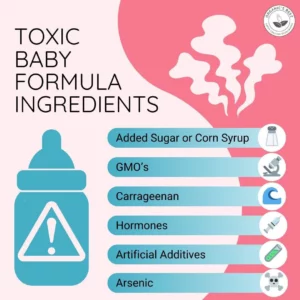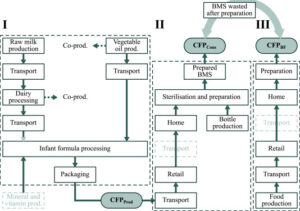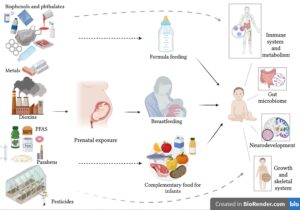Modern baby formulas have become a lifeline for so many families, providing a convenient alternative to breastfeeding. For decades, formula manufacturers have marketed their products as nutritionally complete and essential for those unable to breastfeed. The thing is though, if you take the time to look closer at the ingredient lists and some test results, there’s a pretty troubling spread of preservatives, seed oils, metals, and synthetic chemicals. These substances not only pose risks to infant health but also carry significant environmental implications, as the health of our people and planet are inherently interconnected. This blog explores the issues surrounding conventional baby formulas in effort to help parents make informed decisions while shedding some light on the broader impacts of these products.
Understanding Modern Baby Formulas
Baby formula is supposed to be designed to mimic breast milk and provide essential nutrients for infants. Its widespread use is rooted in convenience and necessity, especially for the increasing number of families facing breastfeeding challenges. However, not all formulas are created equal. Many conventional options are highly processed and packed with ingredients that prioritize shelf life and production costs over health and sustainability.
The marketing of these formulas often completely glosses over the potential downsides of their ingredient profiles. By taking a look at what goes into these products, we can better understand the trade-offs involved in choosing conventional baby formula over more natural alternatives or ones made by companies who care for deep health.
Preservatives: Prolonging Shelf Life at What Cost?
Preservatives play a crucial role in ensuring that baby formulas can be stored for months or even years without spoiling. While this convenience is valuable, it comes at a price. Common preservatives found in baby formulas include synthetic antioxidants such as butylated hydroxyanisole (BHA) and butylated hydroxytoluene (BHT).
These substances, often used to prevent fats from going rancid, have been linked to various health concerns. Studies suggest that BHA and BHT may be endocrine disruptors that interfere with hormonal balance. The long-term effects of exposing developing infants to these chemicals are not well understood, a concerning realization for anyone with little ones.
From an environmental perspective, the production and disposal of preservative-laden products contribute to chemical pollution. These substances can persist in ecosystems, affecting wildlife and water quality.
Seed Oils in Baby Formulas
Seed oils such as soybean, sunflower, and palm oil are staples in many baby formulas. These oils are often included as a source of fat, an essential macronutrient for an infant’s nutrition. But, their high omega-6 fatty acid content and the sourcing of these raises serious concerns about potential inflammatory effects, particularly when consumed in excess as we’ve seen happen with the rest of society.
Palm oil, a common ingredient, has faced widespread criticism for its environmental impact. The production of palm oil is a major driver of deforestation, habitat destruction, and greenhouse gas emissions. Beyond environmental concerns, some studies suggest that palm oil in formulas may hinder calcium absorption, potentially impacting bone development in infants.
Choosing formulas that avoid seed oils or use sustainably sourced alternatives can mitigate some of these concerns. However, such options are not always readily available or affordable, highlighting a significant gap in the market.
Metals and Other Contaminants Hiding in the Mix
Recent investigations have uncovered concerning amounts of heavy metals such as lead, arsenic, and cadmium in some baby formulas. These contaminants often enter the products through the soil where ingredients are grown or during the manufacturing process.
Even in small quantities, heavy metals can have serious health implications for infants. Their developing bodies are particularly vulnerable to the neurotoxic effects of lead and arsenic, which can impair cognitive development and immune function. Although regulatory agencies have set limits for these substances, ongoing reports of contamination suggest that more stringent oversight is needed.
The environmental impact of these contaminants extends beyond their presence in formulas. The agricultural and industrial processes responsible for their introduction often result in broader ecological harm, including, again, soil and water pollution.
The Unknown Variables of Synthetic Chemicals
Many baby formulas contain synthetic ingredients such as emulsifiers, stabilizers, and artificial vitamins. While these additives are generally recognized as safe, their long-term effects on infant health remain largely unstudied.
For example, carrageenan, a common stabilizer, has been linked to gastrointestinal inflammation in some studies. Similarly, artificial vitamins – often used to meet nutritional requirements – may not be as bioavailable as their natural counterparts, potentially reducing their effectiveness or even causing more harm than good for certain populations.
The cumulative impact of these chemicals on a baby’s developing system is a serious concern when you consider that we are allowing meddling with the foundation which their life will be built from. Without more comprehensive research, parents are left to weigh the risks based on limited information.
Environmental Health Impact of Formula Production
The production of conventional and highly processed baby formulas certainly has some negative environmental consequences, as we’ve mentioned throughout this blog. From the agricultural practices used to grow ingredients to the energy-intensive manufacturing processes, formula production consumes vast amounts of resources.
Greenhouse gas emissions from transportation and factory operations contribute to climate change. Water usage and contamination is another critical issue, as crops like soy and palm require significant irrigation. Additionally, the packaging of baby formulas – often made from non-biodegradable materials – adds to the growing problem of plastic waste.
The environmental footprint of conventional formulas in addition to the health concerns above shows us the need for more sustainable practices in the industry as a whole. Supporting brands that prioritize eco-friendly production, packaging, and formulation can help reduce this impact.
Exploring Alternatives
While breastfeeding obviously is the most natural and eco-friendly option, it is not always an option for every family. For those who need to rely on formula, there are alternatives to conventional products that prioritize health and sustainability. 
Organic baby formulas, for instance, avoid synthetic preservatives, seed oils, and artificial additives. Goat milk-based formulas are another option, offering easier digestibility for some infants. Parents should look for products that are certified organic, minimally processed, and free from harmful chemicals.
Reading ingredient labels carefully and researching brands can empower parents to make more informed choices. Consulting with pediatricians and nutritionists can also provide valuable guidance tailored to a baby’s specific needs.
Advocacy and Change
The issues surrounding modern baby formulas are not just personal but a reflection of our systems’ disconnection from nature at large. Parents and consumers can play a vital role in advocating for safer, more sustainable products. Supporting organizations that push for stricter regulations on baby food ingredients can drive meaningful change.
Additionally, raising awareness through social media, community groups, and other platforms can help educate others about the importance of clean, eco-friendly formulas. As demand for healthier options grows, companies will be incentivized to prioritize quality over cost-cutting measures.
Conclusion
Modern baby formulas can offer convenience and nutritional support, but the ingredient profiles and manufacturing processes of so many brands are problematic when you take a closer look. From preservatives and seed oils to heavy metals and synthetic chemicals, these products often come with hidden risks to both infant health and the environment.
By understanding these issues, parents can make more informed choices and advocate for better options. Whether through selecting cleaner formulas, supporting sustainable brands, or pushing for stronger regulations, we can work towards a future where all infants have access to safe and healthy nutrition.









